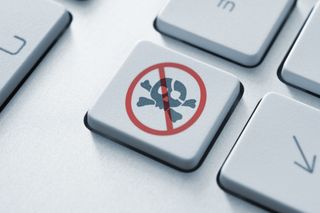GOZeus & CryptoLocker: Top tips to protect your PC & mobile
The NCA and FBI claim PC and mobile users have until June 17 to protect themselves from malware threats. Here's how to go about it...

Last Tuesday, the National Crime Agency (NCA) gave UK computer users a two-week warning about an incoming malware threat that could potentially cost them millions of pounds. Now that June 17 deadline is getting uncomfortably close.
The two threats in question are GOZeus and CryptoLocker, designed to work together to first phish for financial details and then, if none are found, encrypt the user's files and effectively hold them to ransom. It is estimated that around 15,000 UK computers are already infected.
To add to the problem, the NCA's advice to visit the Government-backed Get Safe Online site caused the website to crash, leaving many panicked and wondering how best to dodge the malware threats apparently heading their way. The outage was blamed on too many people attempting to access the site at once, with issues continuing for two days despite efforts to fix the problem.
With just a few days before the NCA predicts the threat will return with a vengeance, it is important for us all to protect our PCs in every way possible. Here's our top six tips on how to evade it.
1. Don't open any links in unsolicited emails
The FBI has warned users about phishing emails that are being used to install GOZeus onto computers, so make sure you know exactly who is emailing you and why before opening any links that arrive in your inbox through unsolicited or spam messages. This is a good general rule of thumb, of course, but is being stressed more than ever in light of these new threats.
2. Update security software
Get the ITPro. daily newsletter
Receive our latest news, industry updates, featured resources and more. Sign up today to receive our FREE report on AI cyber crime & security - newly updated for 2024.
Many of us are guilty of leaving security software to go out-of-date and, even with everything running on the latest version, not using it as well or as frequently as we should. In order to protect your information and prevent criminals from encrypting your files, it is important that all security software on your computer is current and turned on at all times.
3. Change your passwords
With so many cyber threats apparently out to get us of late, the fresh urgency of changing your passwords might give you just a little sense of dj vu. There is a danger that, with the frequency of these threats starting to wear down on people, users may not heed the warnings as they should, but it is essential that passwords are changed when something like this arises. Make sure they are complex and different for each website you use.
4. Back up important files
If your computer succumbs to CryptoLocker then there is a risk your files will be lost, so make sure you backup anything valuable, sensitive or important. These need to be readily available in case you are unable to access them from your computer, and having files and documents stored somewhere else means that the damage done by the malware is minimised.
5. Beware of threats to your mobile
The risk to PCs has been widely reported on, but there's also something else being targeted - your mobile phone. Warnings of copycat malware have started to emerge, with predictions for infected mobile devices rising by up to 100 per cent by the end of 2014. Particular attention should be paid by Android users, who are invariably the targets of nasty ransomware such as Svpeng.
To protect yourself from these threats, don't 'jailbreak' or 'root' your device, use a PIN for the lock-screen and keep it to yourself, don't make important, confidential transactions while out and about on public Wi-Fi and avoid storing important or sensitive data on mobile devices in general.
6. Act immediately
As said, it is estimated that around 15,000 computers in the UK have already been infected with GOZeus, and those users will soon be contacted by their internet service provider informing them that they are at risk. If you receive one of these emails, then it is important that you take action immediately to avoid further problems.
Caroline has been writing about technology for more than a decade, switching between consumer smart home news and reviews and in-depth B2B industry coverage. In addition to her work for IT Pro and Cloud Pro, she has contributed to a number of titles including Expert Reviews, TechRadar, The Week and many more. She is currently the smart home editor across Future Publishing's homes titles.
You can get in touch with Caroline via email at caroline.preece@futurenet.com.





